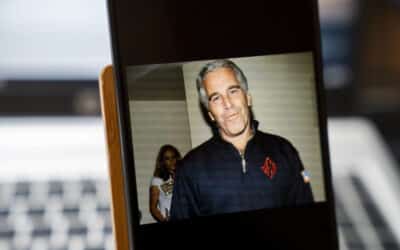U.S. President Donald Trump’s unexpected answer on Sunday to an interviewer’s question has thrown his administration’s nuclear negotiations with Iran into confusion.
Trump has consistently said that negotiations with Iran over its nuclear program are limited to preventing Iran from developing a nuclear weapon: “You know, it’s not a complicated formula. Iran cannot have a nuclear weapon.” But in an interview on NBC’s Meet the Press, when the interviewer asked Trump, “Is the goal of these talks limiting Iran’s nuclear program or total dismantlement?” Trump answered, “Total dismantlement.”
There has been disagreement in the Trump team over, not just the goal of negotiations with Iran, but, more fundamentally, over negotiating with Iran. National Security Advisor Mike Waltz advocated for a military path, while Director of National Intelligence Tulsi Gabbard, Secretary of Defense Pete Hegseth and Vice President J.D. Vance advocated for caution. Vance urged fully exploring talks before settling for a military solution. Trump sided with the diplomacy camp, believing that “we can make a deal without the attack.”
According to reporting by The Washington Post, Trump fired Waltz as National Security Advisor because he opposed Trump and “wanted to take U.S. policy in a direction Trump wasn’t comfortable with because the U.S. hadn’t attempted a diplomatic solution.” Waltz maintained that “the time was ripe to strike Iran.”
Having agreed on the diplomatic path, there appeared to be confusion over the goal of diplomacy. Waltz said that the U.S. is demanding “full dismantlement,” and Trump’s special envoy Steve Witkoff said that “a Trump deal” means “Iran must stop and eliminate its nuclear enrichment and weaponization program.” But these statements had been at odds with Trump’s more limited stated goal. Until Sunday.
If there was a lack of clarity in America’s goals in negotiating, there was no ambiguity in Iran’s. Iran wanted a deal that the United States couldn’t walk away from, as they walked away from the previous 2015 JCPOA nuclear agreement, and they wanted negotiations to lead to three things.
The first is that negotiations have to lead to a cessation of U.S. threats of a military solution. Iranian President Masoud Pezeshkian had made it clear that “the language of threats and coercion is absolutely unacceptable…It is unacceptable for someone to come along and say, ‘Don’t do this, don’t do that, or else.’ I won’t come to negotiate with you.”
The second is that negotiations have to lead the complete lifting of sanctions.
The third is that, while Iran’s Supreme Leader, Ayatollah Ali Khamenei, has fully empowered his team to negotiate, he has placed the firm limit that Iran will not negotiate “the full dismantling of Iran’s nuclear infrastructure.”
The American-Iranian talks were showing signs of success. Iran called the first round “constructive” and “respectful.” The U.S. called it “constructive” and “positive.” The first round led to a second, which led to an agreement to begin work on a framework for a potential deal and a third round of talks.
Then a flurry of confusing and contradictory statements made by U.S. officials in the past few days began to derail the talks.
First, Pete Hegseth returned to the language of threats. Referring to Yemen’s Houthi attacking vessels in the Red Sea, Hegseth “warned” Iran, “You know very well what the U.S. Military is capable of…You will pay the CONSEQUENCE at the time and place of our choosing.” From Iran’s perspective, what is the point in negotiating limits on your civilian nuclear program to avoid American bombs if the United States is going to bomb you anyway for another purpose?
Then Trump returned to the threat of sanctions, posting that “Any Country or person who buys ANY AMOUNT of OIL or PETROCHEMICALS from Iran will be subject to, immediately, Secondary Sanctions. They will not be allowed to do business with the United States of America in any way, shape, or form.”
Following those two statements, the fourth round of scheduled talks between the United States and Iran were postponed. They were allegedly postponed “[f]or logistical reasons.” However, a senior Iranian official said that “U.S. sanctions on Iran during the nuclear talks are not helping the sides to resolve the nuclear dispute through diplomacy” and that “[d]epending on the U.S. approach, the date of the next round of talks will be announced.”
Then came the unexpected threat to future talks. Trump told Meet the Press that the talks are not negotiating what the Iranians thought they were negotiating. The United States he said, is not negotiating verifiable limits on Iran’s civilian nuclear program, it is demanding “total dismantlement” of Iran’s nuclear program.
“That’s all you’ll accept?” the interviewer clarified. “Yeah, that’s all I’d accept,” Trump confirmed.
The interviewer then, wrongly, suggested that Trump’s statement was inconsistent with Marco Rubio, his Secretary of State’s, suggestion that the U.S. “would accept… a peaceful, civilian nuclear program.”
Trump’s statement is not inconsistent with Rubio’s, though, because Rubio’s statement that Iran can have a civilian nuclear program by importing uranium enriched up to 3.67% but no longer by enriching their own, is consistent with Trump’s statement that Iran would have to dismantle its enrichment capability.
Though Trump’s statement may not be inconsistent with Rubio’s, it did, at this point, become a little confused with itself. Trump suggested that Iran has no need of a civilian nuclear program “to make electricity” because “they have so much oil, what do they need it for.” Trump then, confusingly repeated his earlier formulation, saying, “The only thing they can’t have is a nuclear weapon.” He said, “I think that I would be open to hearing” about a civilian nuclear program to generate energy before seemingly shutting it down again with the observation that “civilian energy often leads to military wars.”
The recent return by Washington to military threats and sanctions are not helping negotiations that seemed to be on a path to possible success. Trump’s latest remark that Iran has to fully dismantle its civilian nuclear program and stop all enrichment appears to take away any motivation for Iran to negotiate. Since Trump has said that “If they don’t make a deal, there will be bombing,” it is imperative to clarify the confusion and the positions and get the fourth round of talks back on schedule.
































